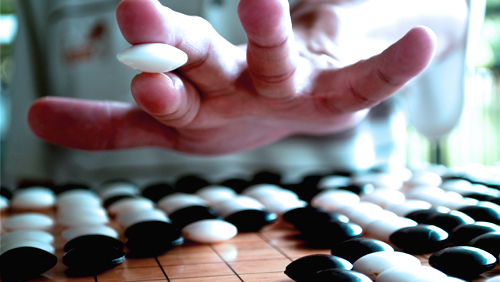Google’s AlphaGo beats one of the world’s top players in the ancient Chinese board game Go, prompting the question as to whether the program could also beat games of imperfect information like no-limit poker?
10-months ago the quartet of Bjorn Li, Dong Kim, Doug Polk, and Jason Les triumphed in a series of Heads-Up No-Limit Hold’em (NLHE) matches against a computer program known as Claudico.
 “I think we can have a new program that can beat humans in a year.” Said Claudico design team member Sam Ganzfried after their defeat.
“I think we can have a new program that can beat humans in a year.” Said Claudico design team member Sam Ganzfried after their defeat.
In the future, we won’t be interested in the Man v Machine debate. That will be old hat. Instead, we will be interested in the titanic tussles of Machine v Machine.
NLHE is a game of incomplete information. While Claudico continues to play millions of hands in preparation for its return match with the fab four, a former chess prodigy has been busy with a new program hell bent on destroying games of complete information. Only one stood in its way – a board game that originated from China, over 3,000 years ago, called Go.
Go is said to be more complex than Chess. It was the type of challenge that Demis Hassabis, vice president of engineering at Alphabet’s DeepMind, and creator of AlphaGo, was well up for. Hassabis co-founded DeepMind in 2010 after a successful stint as a programmer for iconic games such as Theme Park and Black & White.
Google acquired DeepMind in 2014, and after AlphaGo beat the three-time European Go Champion, Fan Hui, 5-0 in October, Google put $1 million dollars on the line in a best of five match-ups between AlphaGo and one of the world’s most proficient Go players Lee Se-Dol.
A few days ago, playing live in front of tens of thousands of Go fans on YouTube, AlphaGo won the first of those matches. Mr. Lee has 18 top international titles on his resume. He was confident of victory. During his press conference, that confidence had been eroded. He now believes his chances of victory in the five-match series are 50-50.
“I am very surprised because I have never thought I would lose,” Mr. Lee told a packed news conference in Seoul. “I didn’t know that AlphaGo would play such a perfect Go.”
It took the machine three and a half hours to beat its human opponent.
DeepMind has promised to donate their $1m purse to a nonprofit organization should they defeat Mr. Lee in their five-game series.
So What Next For AlphaGo?
First up it needs to beat Mr. Lee over that five-game series.
If and when that proves successful, Hassabis and his team have their eyes set on bigger things. They have exciting plans to help humanity in a variety of ways.
Before they get there, they may set their eyes on beating the top humans in imperfect information games. Speaking to the press, Hassabis said ‘no-limit poker is very difficult’ before going on to talk about the potential to compete with the top humans in strategy eSports titles such as StarCraft.
Could AlphaGo do what Claudico could not?
But the games are a taster for the future of much bigger meals. Hassabis and his team are using this information to create better smartphone assistants, and they have inked a deal with the UK’s National Health Service (NHS) to create DeepMind Health where they have begun working on smartphone apps to help the leading kidney experts at the Royal Free Hospital London amongst other things.
“We want to solve intelligence.” Said Hassabis.
Well the NHS is the best place to start.





